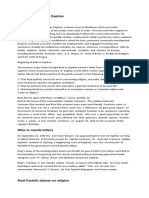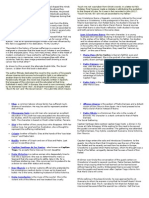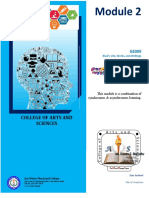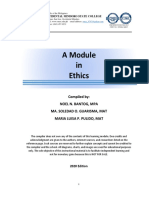0 ratings0% found this document useful (0 votes)
96 viewsWhat Is RA 1425? Why Was It Passed? Give A Short Summary
What Is RA 1425? Why Was It Passed? Give A Short Summary
Uploaded by
Winston VillegasRA 1425, also known as the Rizal Law, requires the study of Jose Rizal's life and works in schools to promote Filipino patriotism. It was passed in 1956 on Philippine Independence Day. The Catholic Church strongly criticized the law, viewing Rizal's novels as sacrilegious. They feared it would violate freedom of religion. Other Catholic groups also opposed the law. The law was only passed after lawmakers agreed to remove offensive parts of Rizal's books and only require universities to teach the full versions. The Senate bill for RA 1425 was Senate Bill 438.
Copyright:
© All Rights Reserved
Available Formats
Download as DOCX, PDF, TXT or read online from Scribd
What Is RA 1425? Why Was It Passed? Give A Short Summary
What Is RA 1425? Why Was It Passed? Give A Short Summary
Uploaded by
Winston Villegas0 ratings0% found this document useful (0 votes)
96 views1 pageRA 1425, also known as the Rizal Law, requires the study of Jose Rizal's life and works in schools to promote Filipino patriotism. It was passed in 1956 on Philippine Independence Day. The Catholic Church strongly criticized the law, viewing Rizal's novels as sacrilegious. They feared it would violate freedom of religion. Other Catholic groups also opposed the law. The law was only passed after lawmakers agreed to remove offensive parts of Rizal's books and only require universities to teach the full versions. The Senate bill for RA 1425 was Senate Bill 438.
Original Title
What-is-RA-1425
Copyright
© © All Rights Reserved
Available Formats
DOCX, PDF, TXT or read online from Scribd
Share this document
Did you find this document useful?
Is this content inappropriate?
RA 1425, also known as the Rizal Law, requires the study of Jose Rizal's life and works in schools to promote Filipino patriotism. It was passed in 1956 on Philippine Independence Day. The Catholic Church strongly criticized the law, viewing Rizal's novels as sacrilegious. They feared it would violate freedom of religion. Other Catholic groups also opposed the law. The law was only passed after lawmakers agreed to remove offensive parts of Rizal's books and only require universities to teach the full versions. The Senate bill for RA 1425 was Senate Bill 438.
Copyright:
© All Rights Reserved
Available Formats
Download as DOCX, PDF, TXT or read online from Scribd
Download as docx, pdf, or txt
0 ratings0% found this document useful (0 votes)
96 views1 pageWhat Is RA 1425? Why Was It Passed? Give A Short Summary
What Is RA 1425? Why Was It Passed? Give A Short Summary
Uploaded by
Winston VillegasRA 1425, also known as the Rizal Law, requires the study of Jose Rizal's life and works in schools to promote Filipino patriotism. It was passed in 1956 on Philippine Independence Day. The Catholic Church strongly criticized the law, viewing Rizal's novels as sacrilegious. They feared it would violate freedom of religion. Other Catholic groups also opposed the law. The law was only passed after lawmakers agreed to remove offensive parts of Rizal's books and only require universities to teach the full versions. The Senate bill for RA 1425 was Senate Bill 438.
Copyright:
© All Rights Reserved
Available Formats
Download as DOCX, PDF, TXT or read online from Scribd
Download as docx, pdf, or txt
You are on page 1of 1
1. What is RA 1425? Why was it passed?
Give a short summary
The Rizal Law, otherwise called RA 1425, decrees the study of Rizal's life and works, as
demonstrated in section 1. This Republic Act requires an expanded feeling of patriotism from the
Filipinos during a period of a decreasing Filipino identity.
In 1955, Senator Claro M. Recto propositioned that all schools in the Philippines to teach
students about the life and works of Jose Rizal. It was passed on June 12, 1956, harmonizing
with the Philippines' Independence Day and is now known as Republic Act 1425, or Rizal Law.
The official title of the law is much longer: An Act to Include in the Curricula of All Public and
Private Schools, Colleges and Universities Courses On the Life, Works and Writings of Jose
Rizal, Particularly His Novels Noli Me Tangere and El Filibusterismo, Authorizing the Printing
and Distribution Thereof, and for Other Purposes.
2. What is the controversy behind RA 1425? Who were the critics of the RA?
The law was heavily criticized by the Catholic Church due to fear that it would violate freedom
of conscience and religion. When the Church found out about Recto’s bill, it equipped its
energies to prevent it from becoming law. Ironically, almost 70 years after the publication
of Noli Me Tangere, the Church still viewed Rizal’s novels as sacrilegious due to anti-clerical
elements in the novel. The Catholic Church of 120 years ago used the same influence in
preventing the novels to be read by Filipinos.
Manila Archbishop Rufino Santos wrote an ardent pastoral letter in resistance. It was read in all
masses in the country, much of the anger of then Manila Mayor Arsenio Lacson, who supposedly
left the mass when he heard the pastoral letter being read. Lacson was perhaps the most vocal
allies of the Rizal Bill.
Many Catholic groups like the Knights of Columbus also opposed the RA and schools run by the
Church banded together in resistance, threatening to shut down if the Rizal Law will be passed.
Sen. Recto reacted by saying the government would basically take control over the
administration of these schools the moment they shut down, and nationalize them.
The Rizal Bill only became the Rizal Law after a settlement between the Catholic Church and
the lawmakers was reached.
The lawmakers, particularly Recto, consented to the state of watering down the ethically
offensive pieces of Rizal's books before they were instructed to schools. They considered it the
expurgated adaptations. Further, it was concurred that only universities and colleges would show
these materials to their students.
3. What is the Senate Bill of RA 1425?
Senate Bill 438
You might also like
- Week 5 BDocument10 pagesWeek 5 BVencint LaranNo ratings yet
- Rizal Module 10 JCDocument12 pagesRizal Module 10 JCFer-J TagacayNo ratings yet
- RizalDocument13 pagesRizalangelcolleenNo ratings yet
- Sociological-Perspective 2Document7 pagesSociological-Perspective 2Ryan RobenacioNo ratings yet
- Report in RizalDocument4 pagesReport in Rizalalexander alobaNo ratings yet
- Postmodern Analysis of The Film TAPB 1Document127 pagesPostmodern Analysis of The Film TAPB 1Paul Darille PascualNo ratings yet
- The Phonetic Structures of Kalanguya (University of The Philippines, Diliman Undergraduate Thesis, 2010)Document11 pagesThe Phonetic Structures of Kalanguya (University of The Philippines, Diliman Undergraduate Thesis, 2010)Paul Julian Santiago100% (1)
- Copy of The Persona in Philippine Folk Literature20200916 - 14193514Document14 pagesCopy of The Persona in Philippine Folk Literature20200916 - 14193514Helena Kristina CosNo ratings yet
- Chapter 9-14Document11 pagesChapter 9-14Mary Jane CañeteNo ratings yet
- Lesson 19 20Document14 pagesLesson 19 20G spotNo ratings yet
- Module 1 - RizalDocument3 pagesModule 1 - RizalMarianna GayatinNo ratings yet
- DALUMATFIL - Activity 2Document7 pagesDALUMATFIL - Activity 2Shawn AldrinNo ratings yet
- CHAPTER 14-Rizal in LondonDocument45 pagesCHAPTER 14-Rizal in LondonVal Vincent M. LosariaNo ratings yet
- In The Patriotic Novel Noli Me TangereDocument4 pagesIn The Patriotic Novel Noli Me TangereSusana DeLara Sto Tomas100% (3)
- Process of Rizal LawDocument21 pagesProcess of Rizal LawVHine CabSaba BiBat33% (3)
- Short Visit To ParisDocument2 pagesShort Visit To ParisMichael John TahadlangitNo ratings yet
- Power Point About Jose Rizal in Expressed of His AdvocacyDocument20 pagesPower Point About Jose Rizal in Expressed of His AdvocacyKJ Marquez100% (2)
- Chapter 19 GarciaDocument10 pagesChapter 19 GarciaLunar WalkerNo ratings yet
- Jose Rizal MidtermDocument11 pagesJose Rizal MidtermJosiah VinoNo ratings yet
- Worksheet For Individual Activity: Can Myself Improve Amidst My Unlikely Acts?Document1 pageWorksheet For Individual Activity: Can Myself Improve Amidst My Unlikely Acts?Opiana Janelle KelseyNo ratings yet
- Week 7 RizalDocument6 pagesWeek 7 RizalShervee PabalateNo ratings yet
- College of Arts and Sciences: PretestDocument5 pagesCollege of Arts and Sciences: PretestLeizel CervantesNo ratings yet
- Gender and LaborDocument9 pagesGender and LaborKristine San Luis PotencianoNo ratings yet
- Claro Mayo Recto: Learning Module For College Rizal'S Life and WorksDocument5 pagesClaro Mayo Recto: Learning Module For College Rizal'S Life and WorksVANESA MANZONNo ratings yet
- Decree Regulating PoloDocument2 pagesDecree Regulating PoloMicsjadeCastilloNo ratings yet
- Jose Rizal Biographical Sketch: (Pilgrimage - Involve A Journey or Search of Moral or Spiritual Significance.)Document5 pagesJose Rizal Biographical Sketch: (Pilgrimage - Involve A Journey or Search of Moral or Spiritual Significance.)Gj Millen AlilioNo ratings yet
- Filipino LanguageDocument4 pagesFilipino Languagenut_crackreNo ratings yet
- Activity (Week 4) Psychosocial Dimensions of SexualityDocument2 pagesActivity (Week 4) Psychosocial Dimensions of SexualityThamiah Izabell OdenaNo ratings yet
- Liworiz Seatwork 1Document4 pagesLiworiz Seatwork 1Pompeyo BarrogaNo ratings yet
- El FilibusterismoDocument11 pagesEl FilibusterismoJunghoon YangParkNo ratings yet
- Frameworks and Principle of DispositionDocument41 pagesFrameworks and Principle of DispositionCookie MonsterNo ratings yet
- Module 4 - America Before Carlos ArrivedDocument3 pagesModule 4 - America Before Carlos ArrivedMonica SarcedaNo ratings yet
- Module 5 Assignment 2Document3 pagesModule 5 Assignment 2Choco PeanutNo ratings yet
- Rizal Module 3Document3 pagesRizal Module 3Geleu PagutayaoNo ratings yet
- Ang Paglilitis Ni Mang SerapioDocument2 pagesAng Paglilitis Ni Mang SerapioLavente RichNo ratings yet
- Activity 5 Leaaders and LeadershipDocument3 pagesActivity 5 Leaaders and LeadershipJohn Tolentino MillanoNo ratings yet
- Analysis of Strokes AND Life PositionsDocument20 pagesAnalysis of Strokes AND Life PositionsJoanne Mae MontanoNo ratings yet
- Life of Rizal ReflectionDocument2 pagesLife of Rizal Reflectionred100% (1)
- La Liga Filipina and KatipunanDocument22 pagesLa Liga Filipina and KatipunanStefennie Ann Benabente GelitoNo ratings yet
- Character AnalysisDocument7 pagesCharacter AnalysisAlexis RamirezNo ratings yet
- Rizal - Midterms (Second Sem)Document29 pagesRizal - Midterms (Second Sem)ANGELO DELA PEÑANo ratings yet
- A Nation For Our ChildrenDocument6 pagesA Nation For Our Childrenstrength, courage, and wisdomNo ratings yet
- Festival Holy Week Marinduque Philippines: Moro-MoroDocument2 pagesFestival Holy Week Marinduque Philippines: Moro-MoroRM FerrancolNo ratings yet
- Res-030811 HTMLDocument11 pagesRes-030811 HTMLJohn Ryan Austria BalbagNo ratings yet
- Por La Educacion Recibe Lustre La PatriaDocument1 pagePor La Educacion Recibe Lustre La PatriaMelissa Faye LuzanoNo ratings yet
- BekikangDocument1 pageBekikangJubilea PresentacionNo ratings yet
- Goodbye To LeonorDocument11 pagesGoodbye To LeonorBrian Jay GimanNo ratings yet
- PH ConstiDocument4 pagesPH ConstiChelsy SantosNo ratings yet
- Group 2women Linked To Rizal and Rizal Winning The LottoDocument15 pagesGroup 2women Linked To Rizal and Rizal Winning The Lottoleny100% (1)
- Little BadBOy Rizal Sa EsapanyaDocument2 pagesLittle BadBOy Rizal Sa EsapanyaMary Grace PeritoNo ratings yet
- PDF - Structure of The Filipino FamilyDocument4 pagesPDF - Structure of The Filipino FamilyOphlynne PC100% (1)
- Grow Old With YouDocument2 pagesGrow Old With YouSaeko FazuiNo ratings yet
- Movie Analysis: Tittle: Okja CharactersDocument2 pagesMovie Analysis: Tittle: Okja CharactersMark Anthony Nieva RafalloNo ratings yet
- Consuelo Ortiga-WPS OfficeDocument5 pagesConsuelo Ortiga-WPS OfficekairahcayeomongosNo ratings yet
- Diosdado MacapagalDocument6 pagesDiosdado MacapagalPatrick Laurenz Aure ChingNo ratings yet
- IM EthicsDocument89 pagesIM EthicsJasmin Gregorio0% (1)
- Tungkung Langit and AlunsinaDocument5 pagesTungkung Langit and AlunsinaIan Dante Arcangeles100% (1)
- Articles About RizalDocument22 pagesArticles About RizalJoie LovenNo ratings yet
- Language-in-education Policies: The Discursive Construction of Intercultural RelationsFrom EverandLanguage-in-education Policies: The Discursive Construction of Intercultural RelationsNo ratings yet
- Why Did The Catholic Church Staunchly Oppose The RDocument3 pagesWhy Did The Catholic Church Staunchly Oppose The Rthe architographerNo ratings yet
- Jagiellonian DynastyDocument8 pagesJagiellonian DynastyWinston VillegasNo ratings yet
- The Development of Tourism in Dumaguete City Before and After The Pandemic-1Document12 pagesThe Development of Tourism in Dumaguete City Before and After The Pandemic-1Winston VillegasNo ratings yet
- ParlPro G1Document9 pagesParlPro G1Winston VillegasNo ratings yet
- Final ThesisDocument85 pagesFinal ThesisWinston VillegasNo ratings yet
- His 39 2Document14 pagesHis 39 2Winston VillegasNo ratings yet
- IV. Rizal Challenges A Frenchman To A DuelDocument4 pagesIV. Rizal Challenges A Frenchman To A DuelWinston VillegasNo ratings yet
- TitleDocument2 pagesTitleWinston VillegasNo ratings yet
- A Comparative Study Between Strands Steam and A&D: October 2018Document21 pagesA Comparative Study Between Strands Steam and A&D: October 2018Winston Villegas100% (1)
- Informal/Casual, Familiar/Intimate, or Ceremonial) For Each Text. Explain Your Reason For Your AnswerDocument2 pagesInformal/Casual, Familiar/Intimate, or Ceremonial) For Each Text. Explain Your Reason For Your AnswerWinston VillegasNo ratings yet
- Philippine PrehistoryDocument4 pagesPhilippine PrehistoryWinston VillegasNo ratings yet
- Sources An Introduction To Historical MethodDocument4 pagesSources An Introduction To Historical MethodWinston VillegasNo ratings yet
- Reaction Paper EtramsDocument1 pageReaction Paper EtramsWinston VillegasNo ratings yet
- Deductive Reasoning 1. All Teachers Wish To Be: Winston Galicano F. VillegasDocument2 pagesDeductive Reasoning 1. All Teachers Wish To Be: Winston Galicano F. VillegasWinston VillegasNo ratings yet
- CWTS Reflection Sheet 1 VillegasDocument1 pageCWTS Reflection Sheet 1 VillegasWinston VillegasNo ratings yet
- CW Poetry and ShitDocument34 pagesCW Poetry and ShitWinston VillegasNo ratings yet
- Donna LeeDocument6 pagesDonna LeeRobert Marcinkovic100% (1)
- Identity and Marginality: Esharp Issue 6:1Document6 pagesIdentity and Marginality: Esharp Issue 6:1cmcb624No ratings yet
- CRIMLAW Digested CasesDocument7 pagesCRIMLAW Digested CasesLu Cas100% (3)
- Ashraf Ali Thanvi PDFDocument26 pagesAshraf Ali Thanvi PDFaditya_2kNo ratings yet
- Handle PaperworkDocument3 pagesHandle PaperworkAngelicaJhoyEscosioNo ratings yet
- Valuation ReportDocument4 pagesValuation ReportAr Srinivas Pullogi100% (1)
- Worrell Detention RulingDocument2 pagesWorrell Detention RulingLaw&CrimeNo ratings yet
- Mallin4e ch04Document8 pagesMallin4e ch04Minh Thư Phạm HuỳnhNo ratings yet
- Em Waves and Transmission Lines - June-2015Document4 pagesEm Waves and Transmission Lines - June-2015Veerayya JavvajiNo ratings yet
- Formulating Business Strategy Using SWOT AnalysisDocument3 pagesFormulating Business Strategy Using SWOT AnalysisMark Kenneth BarrenoNo ratings yet
- J 2024 SCC OnLine SC 1878 Sumeer Vsalegalin 20241019 050413 1 9Document9 pagesJ 2024 SCC OnLine SC 1878 Sumeer Vsalegalin 20241019 050413 1 9prasang292No ratings yet
- People Vs GalanoDocument1 pagePeople Vs GalanoAngelo NavarroNo ratings yet
- The Balochistan Antiquities Act, 2014 (Act No. Xxiv of 2014)Document17 pagesThe Balochistan Antiquities Act, 2014 (Act No. Xxiv of 2014)Shakir NaseerNo ratings yet
- Ambedker IdeologyDocument4 pagesAmbedker IdeologyPhilo B KNo ratings yet
- World Travel and Tourism CouncilDocument4 pagesWorld Travel and Tourism CouncilalmamunduthmNo ratings yet
- P.P Rep 211 C P.P Rep 214 A: Liquidator Former Joint and Several LiquidatorsDocument34 pagesP.P Rep 211 C P.P Rep 214 A: Liquidator Former Joint and Several Liquidatorsmisc miscNo ratings yet
- Two Sample Career Plans:: Example 1Document1 pageTwo Sample Career Plans:: Example 1Niño Embile DellomasNo ratings yet
- Fmdaheadit316563996601882 Notice28062022Document1 pageFmdaheadit316563996601882 Notice28062022aqeel ahmadNo ratings yet
- The Uniform Chart of AccountsDocument137 pagesThe Uniform Chart of AccountsElzein Amir ElzeinNo ratings yet
- Appendix A. Transmittal LettersDocument15 pagesAppendix A. Transmittal LettersAnonymous.No ratings yet
- 1.table of Contents-COSH ManualDocument3 pages1.table of Contents-COSH ManualJob CatiponNo ratings yet
- TRAC Bridge Competition Grades 11 12Document23 pagesTRAC Bridge Competition Grades 11 12Ivan Triandi SaputraNo ratings yet
- 3HAC024480-008 Rev04Document18 pages3HAC024480-008 Rev04TensaigaNo ratings yet
- Types of MarriagesDocument4 pagesTypes of MarriagesManushi YadavNo ratings yet
- Dis Advantages of AbortionDocument5 pagesDis Advantages of AbortionAziil LiizaNo ratings yet
- SAP T-CodeDocument2 pagesSAP T-CodeGaurav MatetwarNo ratings yet
- Possession Notes 2 by TopperDocument7 pagesPossession Notes 2 by TopperDr. Pramod YadavNo ratings yet
- A Project Report On Redressal Mechanism UnderDocument27 pagesA Project Report On Redressal Mechanism UnderSumanth DNo ratings yet
- Uniden Ubc355xlt User ManualDocument68 pagesUniden Ubc355xlt User ManualDan HirawaniNo ratings yet
- Amendment of ConstitutionDocument3 pagesAmendment of ConstitutionAditi SinghNo ratings yet








































































































